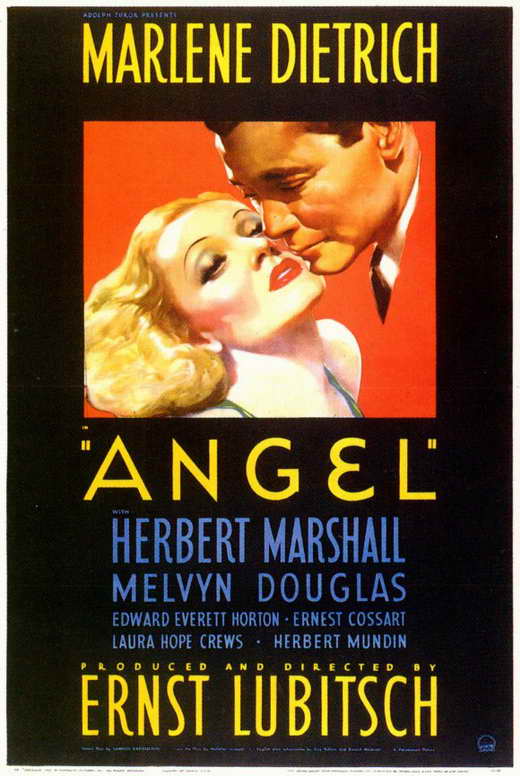
ANGEL (director: Ernst Lubitsch; screenwriter: from the play by Melchior Lengyel/Guy Bolton; cinematographer: Charles Lang Jr.; editor: William Shea; music: Frederick Hollander; cast: Marlene Dietrich (Maria ‘Angel’ Barker), Herbert Marshall (Sir Frederick Barker), Melvyn Douglas (Anthony ‘Tony’ Halton), Edward Everett Horton (Graham), Ernest Cossart (Christopher ‘Chris’ Wilton), Laura Hope Crews (Grand Duchess Anna Dmitrievna); Runtime: 91; MPAA Rating: NR; producer: Ernst Lubitsch; Paramount Pictures; 1937)
“This was a disappointing venture at the box-office, and is the film that labelled Dietrich as “Box Office Poison.”
Reviewed by Dennis Schwartz
Ernst Lubitsch (“Heaven Can Wait”/”To Be or Not to Be”/”Ninotchka”), noted for his sophisticated comedies exhibiting the so-called “Lubitsch Touch,” directs one of his lesser works.
It’s typical of the 1930s romantic comedy with Old World manners. Star Marlene Dietrich sports oversized eyelashes, which she coyly bats once too often to provide the film’s only comedy–of the unintentional kind. It’s based on an old-fashioned play by Melchior Lengyel and is scripted by Guy Bolton.
Maria Barker (Marlene Dietrich) is the attractive neglected wife of stuffy British diplomat Sir Frederick Barker (Herbert Marshall), who questions the marriage as she sneaks off to Paris to visit the Russian émigré, the Grand Duchess Anna Dmitrievna (Laura Hope Crews) for advice, who runs a high-class bordello. At the same time she’s there, the American diplomat Tony Halton (Melvyn Douglas) is there to get some action and mistakes Maria for Anna. They go on an afternoon date to the park, but when he goes to buy her a bouquet of violets she splits. Though they never even exchanged names, he’s fallen madly in love with her and vows to track her down. That he does when he runs into her hubby at the racetrack in London and it appears they knew each other from their days as soldiers during WWI. Invited to lunch, Tony meets Maria and offers her his love. Her suave workaholic hubby offers her material comforts, his good name and excellent manners. He’s busy attending conferences around the world to find peace in a turbulent world, until he realizes that his wife might have been unfaithful to him and takes time off to attend to his personal business. The three meet at the bordello and Maria puts hubby through a test to see if he cares more about her than he does about the job, as she seeks to choose the gentleman who loves her more to be the lucky one to share her boudoir.
This was a disappointing venture at the box-office, and is the film that labelled Dietrich as “Box Office Poison.”
REVIEWED ON 11/19/2007 GRADE: B
© ALL RIGHTS RESERVED DENNIS SCHWARTZ